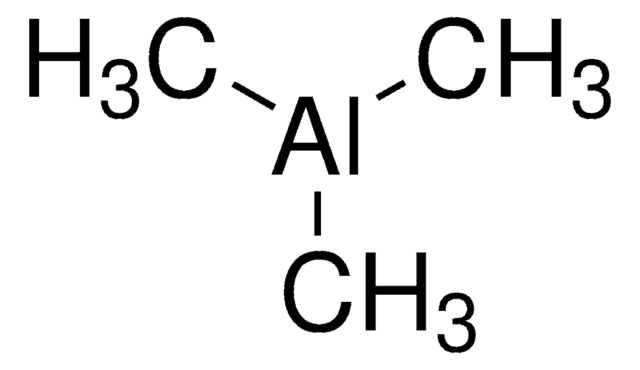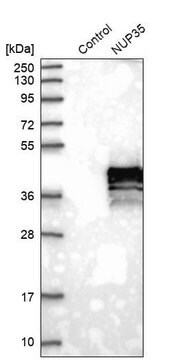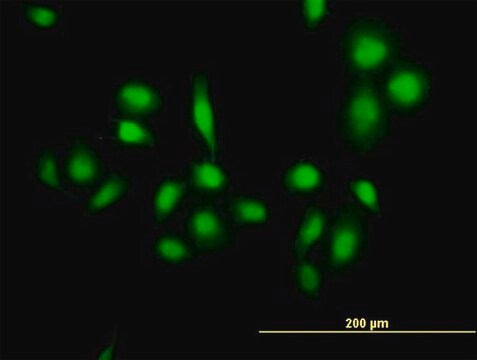추천 제품
생물학적 소스
rabbit
Quality Level
결합
unconjugated
항체 형태
affinity isolated antibody
항체 생산 유형
primary antibodies
클론
polyclonal
제품 라인
Prestige Antibodies® Powered by Atlas Antibodies
양식
buffered aqueous glycerol solution
종 반응성
human
기술
immunohistochemistry: 1:50- 1:200
면역원 서열
SFSVKDPSPLYDMLRKNLVTLATATTDAAQTLALAQDHSMDIPSQDQLKQSAEESSTSRKRTTEDDIPTLP
UniProt 수납 번호
배송 상태
wet ice
저장 온도
−20°C
타겟 번역 후 변형
unmodified
유전자 정보
human ... MDM4(4194)
일반 설명
The gene MDM4 (double minute 4 protein) is mapped to human chromosome 1q32. It belongs to MDM2 gene family and RING (really interesting new gene)-domain superfamily. MDM4 is also called as MDMX.
면역원
MDM4, p53 regulator
애플리케이션
All Prestige Antibodies Powered by Atlas Antibodies are developed and validated by the Human Protein Atlas (HPA) project and as a result, are supported by the most extensive characterization in the industry.
The Human Protein Atlas project can be subdivided into three efforts: Human Tissue Atlas, Cancer Atlas, and Human Cell Atlas. The antibodies that have been generated in support of the Tissue and Cancer Atlas projects have been tested by immunohistochemistry against hundreds of normal and disease tissues and through the recent efforts of the Human Cell Atlas project, many have been characterized by immunofluorescence to map the human proteome not only at the tissue level but now at the subcellular level. These images and the collection of this vast data set can be viewed on the Human Protein Atlas (HPA) site by clicking on the Image Gallery link. We also provide Prestige Antibodies® protocols and other useful information.
The Human Protein Atlas project can be subdivided into three efforts: Human Tissue Atlas, Cancer Atlas, and Human Cell Atlas. The antibodies that have been generated in support of the Tissue and Cancer Atlas projects have been tested by immunohistochemistry against hundreds of normal and disease tissues and through the recent efforts of the Human Cell Atlas project, many have been characterized by immunofluorescence to map the human proteome not only at the tissue level but now at the subcellular level. These images and the collection of this vast data set can be viewed on the Human Protein Atlas (HPA) site by clicking on the Image Gallery link. We also provide Prestige Antibodies® protocols and other useful information.
생화학적/생리학적 작용
MDM4 (Double minute 4 protein) is an oncoprotein which interacts with tumor suppressor protein, p53, and regulates p53 activation. MDM4 can form heterodimer with another member of the family, MDM2. Interaction with MDM2 strengthens MDM2 ability to suppress p53 by ubiquitination. MDM4 also works independently of p53 and results in genomic instability by inhibiting double-strand DNA break repair and DNA-damage response signaling. It is up-regulated in hepatocellular carcinoma, lung cancer, stomach cancer, breast cancer and retinoblastomas.
특징 및 장점
Prestige Antibodies® are highly characterized and extensively validated antibodies with the added benefit of all available characterization data for each target being accessible via the Human Protein Atlas portal linked just below the product name at the top of this page. The uniqueness and low cross-reactivity of the Prestige Antibodies® to other proteins are due to a thorough selection of antigen regions, affinity purification, and stringent selection. Prestige antigen controls are available for every corresponding Prestige Antibody and can be found in the linkage section.
Every Prestige Antibody is tested in the following ways:
Every Prestige Antibody is tested in the following ways:
- IHC tissue array of 44 normal human tissues and 20 of the most common cancer type tissues.
- Protein array of 364 human recombinant protein fragments.
결합
Corresponding Antigen APREST74262
물리적 형태
Solution in phosphate-buffered saline, pH 7.2, containing 40% glycerol and 0.02% sodium azide
법적 정보
Prestige Antibodies is a registered trademark of Merck KGaA, Darmstadt, Germany
면책조항
Unless otherwise stated in our catalog or other company documentation accompanying the product(s), our products are intended for research use only and are not to be used for any other purpose, which includes but is not limited to, unauthorized commercial uses, in vitro diagnostic uses, ex vivo or in vivo therapeutic uses or any type of consumption or application to humans or animals.
적합한 제품을 찾을 수 없으신가요?
당사의 제품 선택기 도구.을(를) 시도해 보세요.
Storage Class Code
10 - Combustible liquids
WGK
WGK 1
Flash Point (°F)
Not applicable
Flash Point (°C)
Not applicable
가장 최신 버전 중 하나를 선택하세요:
A M Carrillo et al.
Oncogene, 34(7), 846-856 (2014-03-13)
The oncogene Mdmx is overexpressed in many human malignancies, and together with Mdm2, negatively regulates the p53 tumor suppressor. However, a p53-independent function of Mdmx that impacts genome stability has been described, but this function is not well understood. In
T Longerich
Der Pathologe, 35 Suppl 2, 177-184 (2014-11-15)
Upregulation of mouse double minute 4 (MDM4) is a frequent event in human hepatocellular carcinoma (HCC) but the underlying molecular mechanisms are poorly characterized. In this study a potential role of the phosphoinositide-3-kinase/v-AKT murine thymoma viral oncogene homolog/mammalian target of
Michael Mendoza et al.
Biomolecular concepts, 5(1), 9-19 (2014-11-06)
MDM2 is an oncoprotein that blocks p53 tumor suppressor-mediated transcriptional transactivation, escorts p53 from the cell nucleus to the cytoplasm, and polyubiquitylates p53. Polyubiquitylated p53 is rapidly degraded in the cytoplasm by the 26S proteasome. MDM2 is abnormally upregulated in
Grzegorz M Popowicz et al.
Cell cycle (Georgetown, Tex.), 7(15), 2441-2443 (2008-08-05)
The Mdmx oncoprotein has only recently emerged as a critical-independent to Mdm2-regulator of p53 activation. We have determined the crystal structure of the N-terminal domain of human Mdmx bound to a 15-residue transactivation domain peptide of human p53. The structure
Lihong Chen et al.
The EMBO journal, 24(19), 3411-3422 (2005-09-16)
The p53 tumor suppressor is activated after DNA damage to maintain genomic stability and prevent transformation. Rapid activation of p53 by ionizing radiation is dependent on signaling by the ATM kinase. MDM2 and MDMX are important p53 regulators and logical
자사의 과학자팀은 생명 과학, 재료 과학, 화학 합성, 크로마토그래피, 분석 및 기타 많은 영역을 포함한 모든 과학 분야에 경험이 있습니다..
고객지원팀으로 연락바랍니다.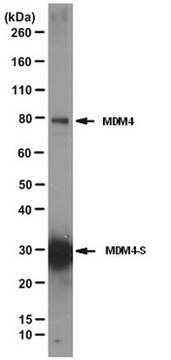
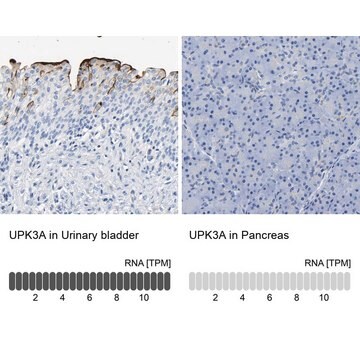
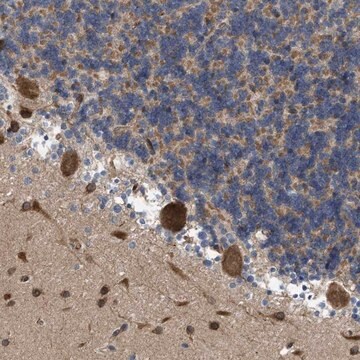

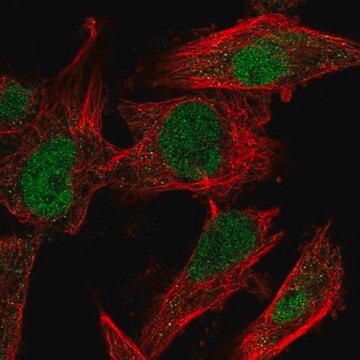
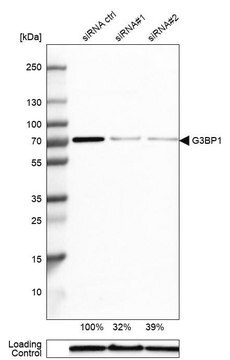
![Dichloro[(S,S)-ethylenebis(4,5,6,7-tetrahydro-1-indenyl)]zirconium(IV)](/deepweb/assets/sigmaaldrich/product/structures/124/554/8e617376-6d1e-4ab5-af24-cd94f4ba26d3/640/8e617376-6d1e-4ab5-af24-cd94f4ba26d3.png)
